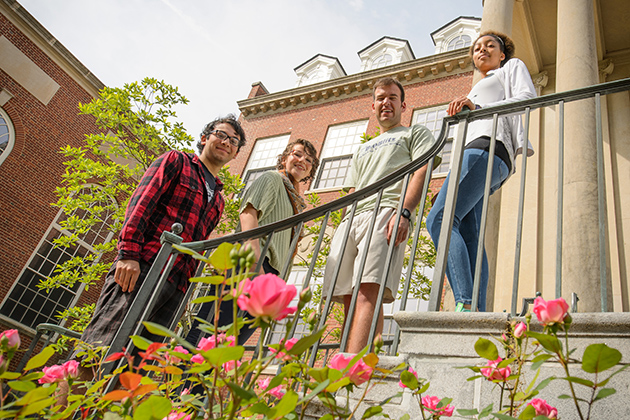While most undergrads have scattered for the summer, four UConn McNair Scholars have settled in for an intensive nine-week research program. As part of the McNair Research Summer, June 3-Aug. 2, these students are conducting original research on the Storrs campus under the guidance of faculty mentors. They are also attending classes to help build the skills needed for admission to, and success in, graduate school.
The McNair Scholars Program, new to UConn this year, supports promising undergraduates in pursuit of doctoral study, mainly in the STEM fields (science, technology, engineering, and math). The program is open to low-income, first-generation students and those from populations under-represented at the graduate level.
The McNair Program pays for the students’ room and board and also provides a stipend while they complete their summer research. Here is what these four McNair Scholars will be studying this summer:

Angelina Hernandez ’14 (CLAS) – How New College Students Cope with Stress
With the help of students in UConn’s Student Support Services (SSS) pre-collegiate summer program, rising senior Angelina Hernandez will conduct research on how new college students cope with stress. Hernandez is pursuing a double major in psychology and human development/family studies. Her McNair faculty mentor is psychology professor Crystal Park.
At various points during the six-week SSS summer program, in which incoming freshmen live on campus and take university-level courses, participants will take an online survey that indicates their perceived stress levels, as well as their exercise and eating habits. Hernandez will analyze students’ eating and exercise coping mechanism trends throughout the summer. She hypothesizes that the social support students get from being part of the summer program will ameliorate the stress of adjusting to college life.
In the fall, Hernandez will survey incoming freshmen with backgrounds similar to the summer students, but who did not attend the summer program. She will compare the results to determine whether, and to what extent, the summer program helps students cope with the transition to college.
Luis Organista ’14 (CANR) – The Effects of Fishing on Largemouth Bass
Luis Organista, a rising senior majoring in natural resources and the environment, will study the effects of fishing on the growth rate of largemouth bass. His faculty mentor, Jason Vokoun, is director of UConn’s Wildlife and Fisheries Conservation Center.
Organista will examine largemouth bass from fished and non-fished ponds near Storrs and compare the two populations. He hypothesizes that the bass from the fished populations will lack genetic information present in the non-fished populations, and therefore may grow at a slower rate.
In the fall, Organista will continue the study, looking at the metabolic rates of the bass and studying their scales. The rings on a fish’s scales can be used to measure the growth of the fish similar to the way the rings in a tree’s trunk can be used to measure the tree’s growth from year to year.
The goal of Organista’s research is to determine how the sport of fishing may impact fish populations.
Tiahna Spencer ’15 (CLAS) – Treating Parkinson’s Disease
Tiahna Spencer, a rising junior majoring in physiology and neurobiology, will work with faculty mentor John Salamone in the Department of Psychology investigating a treatment for Parkinson’s disease.
Spencer will observe mice that have been exposed to a drug that induces tremors similar to those experienced by humans diagnosed with Parkinson’s disease. First she will examine how long it takes for the mice to develop Parkinson’s symptoms. Then she will expose the same mice to another drug that reduces Parkinson’s symptoms, and analyze the results.
Through her study, Spencer aims to learn more about the causes of Parkinson’s disease, and contribute to research that may lead to an effective therapy for human patients with this debilitating disease.
Robert Stickels ’15 (CLAS) – Estrogen’s Role in Male Reproductive Development
Molecular and cell biology major Robert Stickels, a rising junior, will study the role of estrogen in the development of the male reproductive system. He will work with faculty mentor Andrew Pask in the Department of Molecular and Cell Biology.
Previous studies have shown estrogen treatment at birth to induce full sex reversal in the wallaby, a marsupial. Because estrogen is known to have this effect on another mammal species, Stickels wants to see if it may have the same effect on humans.
Stickels will study how estrogen influences a particular type of human cell that nourishes developing sperm cells. His goal is to examine how estrogen interacts with the human genome to affect sexual development.
This study, which he will continue during the 2013-14 academic year, could help shed light on the increase in sexual-development disorders over the past century, according to Stickels. These disorders have been linked to a rise in the use of plastic and pesticide compounds, which exhibit estrogen-like activity.
In addition to working with faculty mentors and graduate students in their research laboratories over the summer, the McNair Scholars will attend GRE-preparation and scientific writing courses and professional development seminars. They will also go on educational outings around New England to explore graduate programs and career opportunities in the STEM fields. The goal is to prepare the Scholars for admission to graduate school, teach them how to communicate with the scientific community about their research, and help them identify potential career choices open to those with a Ph.D. degree.
Managed by the Center for Academic Programs, the McNair Scholars Program is funded by a five-year, $1.1 million grant from the U.S. Department of Education. The program is named for NASA astronaut Ronald E. McNair, who died in an explosion during the launch of the space shuttle Challenger in 1986.
For more information about UConn’s McNair Scholars Program, visit www.cap.uconn.edu/msp or email mcnair.scholars@uconn.edu.


